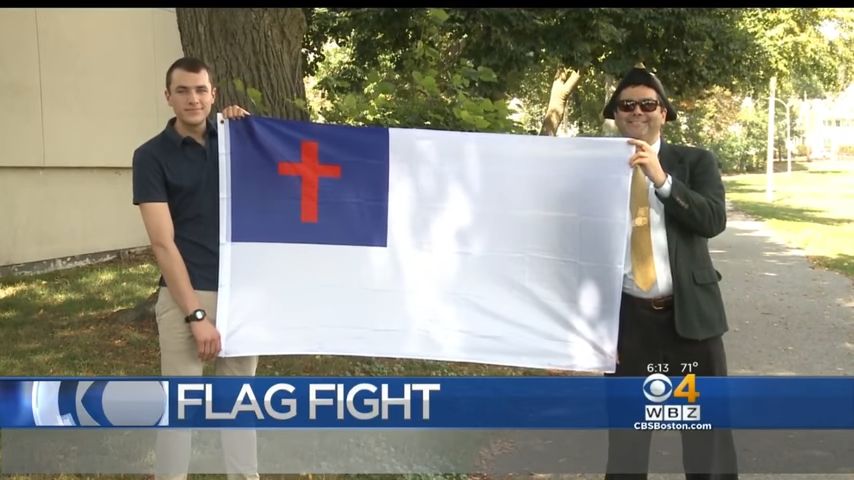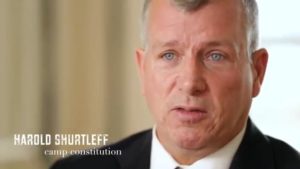Unanimous Supreme Court: Boston violated free speech in denying Christian flag at city hall event

WASHINGTON — The U.S. Supreme Court has unanimously ruled that the City of Boston violated the Constitution in declining a request to fly the Christian flag outside of city hall during an event organized by a private, not governmental, organization.
“Because the flag-raising program did not express government speech, Boston’s refusal to let petitioners fly their flag violated the Free Speech Clause of the First Amendment,” the court declared on Monday. “When the government does not speak for itself, it may not exclude private speech based on ‘religious viewpoint’; doing so ‘constitutes impermissible viewpoint discrimination.’”
The justices concluded that since the City allows a plethora of groups to temporarily fly their flags at the site throughout the year — from the flags of foreign nations, to homosexual pride banners, to flags acknowledging EMS workers — its “come-one-come-all practice” does not suggest government endorsement of every hoisted message.
“The boundary between government speech and private expression can blur when, as here, the government invites the people to participate in a program. In those situations, the court conducts a holistic inquiry to determine whether the government intends to speak for itself or, rather, to regulate private expression,” a syllabus of the decision outlined.
“Boston’s lack of meaningful involvement in the selection of flags or the crafting of their messages leads the court to classify the third-party flag raisings as private, not government, speech.”
Because the flag is private speech, the government may not specifically exclude messages that are religious, as it did in this case.
“Under our precedents, and in view of our government-speech holding here, that refusal discriminated based on religious viewpoint and violated the Free Speech Clause,” wrote Justice Breyer in the main opinion.
Read the ruling in full here, which is accompanied by separate and concurring opinions from Justices Kavanaugh, Alito and Gorsuch.
As previously reported, the City of Boston was first sued in 2018 after it rejected a group’s application to fly the Christian flag outside city hall during an event celebrating the religious history of the city and the contributions made by Christians. Camp Constitution and its director, Hall Shurtleff, sought to host the event in September 2017, presenting short speeches by local pastors outlining the religious history of the city.
September 17 is recognized as “Constitution Day and Citizenship Day” by federal statute.

In response to the request, Gregory Rooney, the commissioner of the Property Management Department, advised in writing that “[t]he City of Boston maintains a policy and practice of respectfully refraining from flying non-secular flags on the city hall flagpoles.”
He said that the City’s policy was based on the First Amendment’s “establishment of religion” clause, and outlined that he would consider a request to fly a non-religious flag, which Shurtleff declined.
According to the Camp Constitution website, the group exists “to enhance understanding of our Judeo-Christian moral heritage, our American heritage of courage and ingenuity, including the genius of our United States Constitution, and the application of free enterprise, which together gave our nation an unprecedented history of growth and prosperity, making us the envy of the world.”
Camp Constitution consequently obtained legal representation, which wrote to the City to contend that the denial was unconstitutional. It soon also filed suit, noting that other flags that were approved to be flown include the rainbow flag for homosexual Pride Month, as well as a blue, pink and white flag to recognize those who identify as transgender.
“Proud to fly the #TransFlag over Boston City Hall for the 1st time in MA history — a sign that everyone is welcome,” then-Mayor Marty Walsh, now U.S. Secretary of Labor, tweeted in 2016.
A federal judge ruled against Camp Constitution in August 2018, as did an appeals court, and Shurtleff refiled the legal challenge.
In 2020, Judge Denise Casper, appointed to the bench by then-President Barack Obama, likewise rejected Shurtleff’s arguments, concluding that the flag — being raised at city hall and adjacent to government emblems — would constitute, and be considered by the public as, government speech. The City is therefore permitted to control the message being expressed, she stated.
Casper also noted that while the City of Boston has flown many other flags, it doesn’t fly religious flags at all, thereby avoiding a violation of the Constitution’s Equal Protection clause.
“The City’s desire not to have its speech co-opted to promote a religious message cannot be seen as an improper inhibition of religion, when its primary reason for denying the application was to avoid the risk of violating the Establishment Clause by appearing to make ‘a government effort to favor a particular religious sect,’” she wrote.
However, the Supreme Court reversed the decision on Monday and remanded the case for further proceedings in light of its analysis.
“This dispute arose only because of a government official’s mistaken understanding of the Establishment Clause,” wrote Justice Brett Kavanaugh. “As this court has repeatedly made clear, … a government does not violate the Establishment Clause merely because it treats religious persons, organizations, and speech equally with secular persons, organizations, and speech in public programs, benefits, facilities, and the like.”
“Under the Constitution, a government may not treat religious persons, religious organizations, or religious speech as second-class,” he said.
Become a Christian News Network Supporter…







Comments are closed.